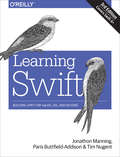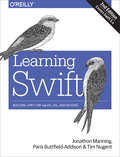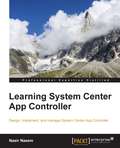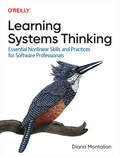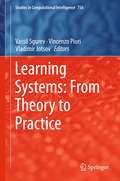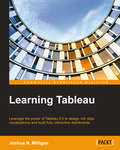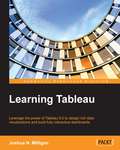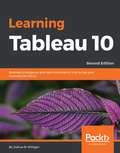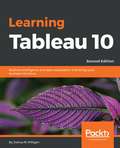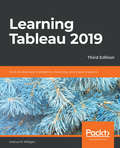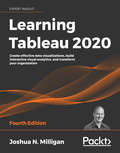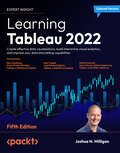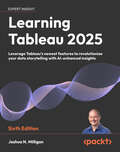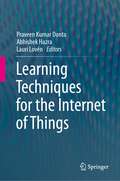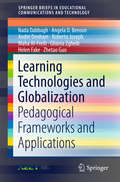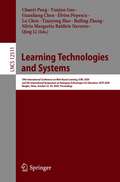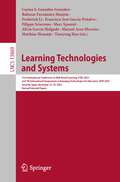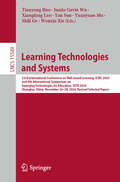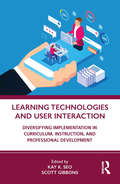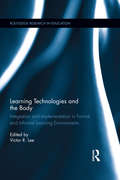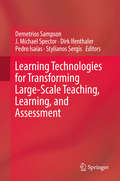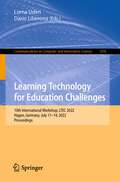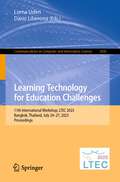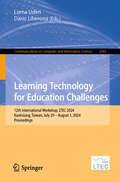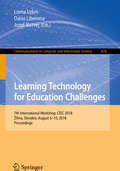- Table View
- List View
Learning Swift: Building Apps for macOS, iOS, and Beyond
by Paris Buttfield-Addison Jonathon Manning Tim NugentGet valuable hands-on experience with Swift, the open source programming language developed by Apple. With this practical guide, skilled programmers with little or no knowledge of Apple development will learn how to code with the latest version of Swift by developing a working iOS app from start to finish.You’ll begin with Swift programming basics—including guidelines for making your code "Swifty"—and learn how to work with Xcode and its built-in Interface Builder. Then you’ll dive step-by-step into building and customizing a basic app for taking, editing, and deleting selfies. You’ll also tune and test the app for performance and manage the app’s presence in the App Store.Divided into four parts, this book includes:Swift 4 basics: Learn Swift’s basic building blocks and the features of object-oriented developmentBuilding the Selfiegram app: Build model objects and the UI for your selfie app and add location support, user settings, and notificationsPolishing Selfiegram: Create a theme and support for sharing and add custom views, image overlays, and localizationBeyond app development: Debug and performance test with Xcode, automate chores with Fastlane, and user-test the app with TestFlight
Learning Swift: Building Apps for macOS, iOS, and Beyond (2nd Edition)
by Paris Buttfield-Addison Tim Nugent Jon ManningGet valuable hands-on experience with Swift 3, the latest version of Apple’s programming language. With this practical guide, skilled programmers with little or no knowledge of Apple development will learn how to code with Swift 3 by developing three complete, tightly linked versions of the Notes application for the OS X, iOS, and watchOS platforms.In the process, you’ll learn Swift’s fundamentals, including its syntax and features, along with the basics of the Cocoa, CocoaTouch, and WatchKit frameworks. This book teaches you how to use common design patterns for Swift, how to structure an application for Apple’s platforms, and how to submit working apps to the App Store.Divided into four distinct parts, this book includes: Swift 2 basics: Learn Swift’s basic building blocks and features for object-oriented development; OS X app development: Set up the document model, build out features, and sync data with iCloud; iOS app development: Use multimedia, contacts, location, notifications, and iCloud files to build a fully featured iOS Notes app; Advanced app extensions: Build an Apple Watch app, and learn how to debug, monitor, and test all three of your Swift apps
Learning System Center App Controller
by Nasir NaeemThis book is intended for IT professionals working with Hyper-V, Azure cloud, VMM, and private cloud technologies who are looking for a quick way to get up and running with System Center 2012 R2 App Controller. To get the most out of this book, you should be familiar with Microsoft Hyper-V technology. Knowledge of Virtual Machine Manager is helpful but not mandatory.
Learning Systems Thinking: Essential Nonlinear Skills and Practices for Software Professionals
by Diana MontalionWelcome to the systems age, where software professionals are no longer building software&emdash;we're building systems of software. Change is continuously deployed across software ecosystems coordinated by responsive infrastructure. In this world of increasing relational complexity, we need to think differently. Many of our challenges are systemic. This book shows you how systems thinking can guide you through the complexity of modern systems. Rather than relying on traditional reductionistic approaches, author Diana Montalion shows you how to expand your skill set so we can think, communicate, and act as healthy systems.Systems thinking is a practice that improves your effectiveness and enables you to lead impactful change. Through a series of practices and real-world scenarios, you'll learn to shift your perspective in order to design, develop, and deliver better outcomes.You'll learn:How linear thinking limits your ability to solve system challengesCommon obstacles to systems thinking and how to move past themNew skills and practices that will transform how you think, learn, and leadMethods for thinking well with others and creating sound recommendationsHow to measure success in the midst of complexity and uncertainty
Learning Systems: From Theory to Practice (Studies In Computational Intelligence #756)
by Vincenzo Piuri Vassil Sgurev Vladimir JotsovBy presenting the latest advances in fuzzy sets and computing with words from around the globe, this book disseminates recent innovations in advanced intelligent technologies and systems. From intelligent control and intuitionistic fuzzy quantifiers to various data science and industrial applications, it includes a wide range of valuable lessons learned and ideas for future intelligent products and systems.
Learning Tableau
by Joshua N. MilliganIf you want to understand your data using data visualization and don't know where to start, then this is the book for you. Whether you are a beginner or have years of experience, this book will help you to quickly acquire the skills and techniques used to discover, analyze, and communicate data visually. Some familiarity with databases and data structures is helpful, but not required.
Learning Tableau
by Joshua N. Milligan<P><P>Key Features <P><P>Create meaningful data visualizations and dashboards in Tableau <P><P>Analyze and display your data effectively using Tableau <P><P>Extend the value and functionality of your data with this step-by-step guide <P><P>Book Description <P><P>In the professional world, turning massive amounts of data into something that can be seen and understood is vitally important. This is where Tableau steps in. It has emerged as a clear leader in data visualization because it translates your actions into a database query and expresses the response graphically. <P><P>It also has the unique ability to do ad hoc analysis of millions of rows of data in just a matter of seconds with Tableau's Data Engine. Tableau is a rare software platform that is intuitive and even fun to use, which also enables you to dive deep into answering complex questions about your data. <P><P>Starting with creating your first dashboard in Tableau 9.0, this book will let you in on some useful tips and tricks, teach you to tell data stories using dashboards, and teach you how to share these data stories. Practical examples along with detailed explanations of how and why various techniques work will help you learn and master Tableau quickly. <P><P>What you will learn <P><P>Explore and analyze your data by creating basic and advanced data visualizations <P><P>Fix data problems, enhance your analysis, and create rich interactivity using custom calculations <P><P>Perform effective analysis by joining and blending data from different sources <P><P>Enhance your visualizations with custom formatting, labels, and annotations <P><P>Explore advanced topics such as sheet swapping, custom maps, and LOD calculations <P><P>Create meaningful dashboards in Tableau <P><P>Extend the value and functionality of your data <P><P>Share your data story using story points and fully interactive dashboards
Learning Tableau 10 - Second Edition
by Joshua N. MilliganLearn how to create effective data visualizations with Tableau and unlock a smarter approach to business analytics. It might just transform your organization About This Book * Create stylish visualizations and dashboards that explain complexity with clarity * Learn effective data storytelling to transform how your business uses ideas and makes decisions * Explore all the new features in Tableau 10 and start to redefine what business analytics means to your organization Who This Book Is For Got data? Not sure what to make of it? This is the guide for you - whether you've been working with Tableau for years or are just beginning your adventure into business analytics. What You Will Learn * Find out how to build effective visualizations and dashboards * Prepare and clean your data so you can be sure Tableau is finding answers to your questions - not raising more problems * Discover how to create advanced visualizations that explain complexity with clarity and style * Dig deeper into your data with clustering and distribution models that allow you to analyze trends and make forecasts * Learn how to use data storytelling to aid decision-making and strategy * Share dashboards and visualizations to cultivate a culture where data is available and valued In Detail Tableau has for some time been one of the most popular Business Intelligence and data visualization tools available. Why? Because, quite simply, it's a tool that's responsive to the needs of modern businesses. But it's most effective when you know how to get what you want from it - it might make your business intelligent, but it isn't going to make you intelligent... We'll make sure you're well prepared to take full advantage of Tableau 10's new features. Whether you're an experienced data analyst that wants to explore 2016's new Tableau, or you're a beginner that wants to expand their skillset and bring a more professional and sharper approach to their organization, we've got you covered. Beginning with the fundamentals, such as data preparation, you'll soon learn how to build and customize your own data visualizations and dashboards, essential for high-level visibility and effective data storytelling. You'll also find out how to so trend analysis and forecasting using clustering and distribution models to inform your analytics. But it's not just about you - when it comes to data it's all about availability and access. That's why we'll show you how to share your Tableau visualizations. It's only once insights are shared and communicated that you - and your organization - will start making smarter and informed decisions. And really, that's exactly what this guide is for. Style and approach Practical yet comprehensive, this Tableau guide takes you from the fundamentals of the tool before diving deeper into creating advanced visualizations. Covering the latest features found in Tableau 10, this might be the guide that transforms your organization.
Learning Tableau 10 Second Edition
by Joshua N. Milligan<P><P>Learn how to create effective data visualizations with Tableau and unlock a smarter approach to business analytics. It might just transform your organization <P><P>About This Book <P><P>Create stylish visualizations and dashboards that explain complexity with clarity <P><P>Learn effective data storytelling to transform how your business uses ideas and makes decisions <P><P>Explore all the new features in Tableau 10 and start to redefine what business analytics means to your organization <P><P>Who This Book Is For <P><P>Got data? Not sure what to make of it? This is the guide for you - whether you've been working with Tableau for years or are just beginning your adventure into business analytics. <P><P>What You Will Learn <P><P>Find out how to build effective visualizations and dashboards <P><P>Prepare and clean your data so you can be sure Tableau is finding answers to your questions - not raising more problems <P><P>Discover how to create advanced visualizations that explain complexity with clarity and style <P><P>Dig deeper into your data with clustering and distribution models that allow you to analyze trends and make forecasts <P><P>Learn how to use data storytelling to aid decision-making and strategy <P><P>Share dashboards and visualizations to cultivate a culture where data is available and valued <P><P>In Detail <P><P>Tableau has for some time been one of the most popular Business Intelligence and data visualization tools available. Why? Because, quite simply, it's a tool that's responsive to the needs of modern businesses. But it's most effective when you know how to get what you want from it - it might make your business intelligent, but it isn't going to make you intelligent. <P><P>We'll make sure you're well prepared to take full advantage of Tableau 10's new features. Whether you're an experienced data analyst that wants to explore 2016's new Tableau, or you're a beginner that wants to expand their skillset and bring a more professional and sharper approach to their organization, we've got you covered. Beginning with the fundamentals, such as data preparation, you'll soon learn how to build and customize your own data visualizations and dashboards, essential for high-level visibility and effective data storytelling. You'll also find out how to so trend analysis and forecasting using clustering and distribution models to inform your analytics. <P><P>But it's not just about you - when it comes to data it's all about availability and access. That's why we'll show you how to share your Tableau visualizations. It's only once insights are shared and communicated that you - and your organization - will start making smarter and informed decisions. And really, that's exactly what this guide is for.
Learning Tableau 2019: Tools for Business Intelligence, data prep, and visual analytics, 3rd Edition
by Joshua N. MilliganCreate powerful data visualizations and unlock intelligent business insights with Tableau Key Features Explore all the latest Tableau 2019 features and redefine business analytics for your organization Create impressive data visualizations and interactive dashboards to get insights from your data Learn effective data storytelling to transform how your business leverages data and makes decisions Book Description Tableau is the gold standard of business intelligence and visual analytics tools in every industry. It enables rapid data visualization and interpretation with charts, graphs, dashboards, and much more. Updated with the latest features of Tableau, this book takes you from the foundations of the Tableau 2019 paradigm through to advanced topics. This third edition of the bestselling guide by Tableau Zen Master, Joshua Milligan, will help you come to grips with updated features, such as set actions and transparent views. Beginning with installation, you'll create your first visualizations with Tableau and then explore practical examples and advanced techniques. You'll create bar charts, tree maps, scatterplots, time series, and a variety of other visualizations. Next, you'll discover techniques to overcome challenges presented by data structure and quality and engage in effective data storytelling and decision making with business critical information. Finally, you'll be introduced to Tableau Prep, and learn how to use it to integrate and shape data for analysis. By the end of this book, you will be equipped to leverage the powerful features of Tableau 2019 for decision making. What you will learn Develop stunning visualizations that explain complexity with clarity Explore the exciting new features of Tableau Desktop and Tableau Prep Connect to various data sources to bring all your data together Uncover techniques to prep and structure your data for easy analysis Create and use calculations to solve problems and enrich analytics Master advanced topics such as sets, LOD calcs, and much more Enable smart decisions with clustering, distribution, and forecasting Share your data stories to build a culture of trust and action Who this book is for This Tableau book is for anyone who wants to understand data. If you're new to Tableau, don't worry. This book builds on the foundations to help you understand how Tableau really works and then builds on that knowledge with practical examples before moving on to advanced techniques. Working experience with databases will be useful but is not necessary to get the most out of this book.
Learning Tableau 2020: Create effective data visualizations, build interactive visual analytics, and transform your organization, 4th Edition
by Joshua N. MilliganGain a solid foundation to learn Tableau, and develop the skills and abilities required for an advanced mastery of the tool. Whether you're new to Tableau or have been using it years, you will benefit from this book. Key Features Explore the latest Tableau 2020 features and redefine business analytics for your firm Understand visualizing data and creating interactive dashboards to gain meaningful insights Learn implementing effective data storytelling to redefine how your business leverages data and makes decisions Book Description Learning Tableau strengthens your command on Tableau fundamentals and builds on advanced topics. The book starts by taking you through foundational principles of Tableau. We then demonstrate various types of connections and how to work with metadata. We teach you to use a wide variety of visualizations to analyze and communicate the data, and introduce you to calculations and parameters. We then take an in-depth look at level of detail (LOD) expressions and use them to solve complex data challenges. Up next, we show table calculations, how to extend and alter default visualizations, build an interactive dashboard, and master the art of telling stories with data. This Tableau book will introduce you to visual statistical analytics capabilities, create different types of visualizations and dynamic dashboards for rich user experiences. We then move on to maps and geospatial visualization, and the new Data Model capabilities introduced in Tableau 2020.2. You will further use Tableau Prep's ability to clean and structure data and share the stories contained in your data. By the end of this book, you will be proficient in implementing the powerful features of Tableau 2020 for decision-making. What you will learn Develop stunning visualizations to explain complex data with clarity Explore exciting new Data Model capabilities Connect to various data sources to bring all your data together Leverage Tableau Prep Builder's amazing capabilities for data cleaning and structuring Create and use calculations to solve problems and enrich the analytics Master advanced topics such as sets, LOD calculations, and much more Enable smart decisions with data clustering, distribution, and forecasting Share your data stories to build a culture of trust and action Who this book is for This Tableau book is for anyone who wants to understand data. If you're new to Tableau, don't worry. This book will simplify Tableau for beginners to build on the foundations to help you understand how Tableau really works and then builds on that knowledge with practical examples before moving on to advanced techniques. Having a bit of background with data will help, but you don't need to know scripting, SQL or database structures.
Learning Tableau 2022: Create effective data visualizations, build interactive visual analytics, and improve your data storytelling capabilities, 5th Edition
by Joshua N. Milligan Mark Tossell Blair Hutchinson Roberto AndreoliNow in color, this edition of Learning Tableau will empower you to bring data to life and make better business decisionsKey FeaturesLearn the basics of data analysis, from snappy visualizations to comprehensive dashboardsGain meaningful insights with geospatial analysis, scripting extensions, and other advanced methodsExplore the latest Tableau 2022 features, including Einstein Discovery and Explain DataBook DescriptionLearning Tableau 2022 helps you get started with Tableau and data visualization, but it does more than just cover the basic principles. It helps you understand how to analyze and communicate data visually, and articulate data stories using advanced features.This new edition is updated with Tableau's latest features, such as dashboard extensions, Explain Data, and integration with CRM Analytics (Einstein Analytics), which will help you harness the full potential of artificial intelligence (AI) and predictive modeling in Tableau.After an exploration of the core principles, this book will teach you how to use table and level of detail calculations to extend and alter default visualizations, build interactive dashboards, and master the art of telling stories with data.You'll learn about visual statistical analytics and create different types of static and animated visualizations and dashboards for rich user experiences. We then move on to interlinking different data sources with Tableau's Data Model capabilities, along with maps and geospatial visualization. You will further use Tableau Prep Builder's ability to efficiently clean and structure data.By the end of this book, you will be proficient in implementing the powerful features of Tableau 2022 to improve the business intelligence insights you can extract from your data.What you will learnDevelop stunning visualizations to explain complex data with clarityBuild interactive dashboards to drive actionable user insightsExplore Data Model capabilities and interlink data from various sourcesCreate and use calculations to solve problems and enrich your analyticsEnable smart decision-making with data clustering, distribution, and forecastingExtend Tableau's native functionality with extensions, scripts, and AI through CRM Analytics (formerly Einstein Analytics)Leverage Tableau Prep Builder's amazing capabilities for data cleaning and structuringShare your data stories to build a culture of trust and actionWho this book is forThis Tableau book is for aspiring BI developers and data analysts, data scientists, researchers, and anyone else who wants to gain a deeper understanding of data through Tableau. This book starts from the ground up, so you won't need any prior experience with Tableau before you dive in, but a full Tableau license (or 14-day demo license) is essential to be able to make use of all the exercises.
Learning Tableau 2024: Master Tableau's newest features to revolutionize your data storytelling with AI-enhanced insights
by Joshua N. MilliganExplore the full potential of Tableau and learn how to draw valuable insights from data directly from a Tableau Visionary (Zen Master). Purchase of the print or Kindle book includes a free PDF ebook.Key FeaturesExplore the new Tableau AI features including Tableau Pulse, Tableau Agent, and other AI enhancements enabling machine learning, GPT, and NLPTransform complex datasets into interactive insights using new features of the Tableau data model and Tableau PrepGain deeper insights with geospatial analysis, scripting extensions, and other advanced methodsBook Description"Learning Tableau 2024" marks a new era in data visualization and analysis, bringing together advanced AI integrations and dynamic user experiences. This sixth edition, authored by Tableau Visionary (Zen Master) Joshua Miligan, is your comprehensive guide to mastering the latest innovations in Tableau that transform raw data into actionable insights. This edition introduces groundbreaking features like Tableau AI (including Tableau Pulse and Tableau Agent), enhancing your analytical capabilities with AI-driven data exploration and automated insights. With detailed walkthroughs, you’ll learn to build dynamic dashboards that respond to your data in real time and delve into sophisticated AI functionalities that predict trends and model scenarios. Whether you're a seasoned data professional or new to Tableau, this book provides the tools you need to leverage Tableau’s full potential. From integrating diverse data sources using the enhanced Data Model to employing advanced geospatial functions for detailed mapping, every chapter is packed with expert knowledge and practical applications designed to put powerful analytics at your fingertips.What you will learnImplement advanced AI features to streamline data analysisBuild and customize dynamic dashboards for interactive data storytellingLeverage new geospatial functions for comprehensive mappingEnhance data prep with Tableau Prep's new featuresIntegrate and analyze data from multiple sources effectivelyWho this book is forThis Tableau book is for aspiring BI developers and data analysts, data scientists, researchers, and anyone else who wants to gain a deeper understanding of data through Tableau. This book starts from the ground up, so you won't need any prior experience with Tableau before you dive in, but a full Tableau license (or 14-day demo license) is essential to be able to make use of all the exercises.
Learning Techniques for the Internet of Things
by Praveen Kumar Donta Abhishek Hazra Lauri LovénThe book is structured into thirteen chapters; each comes with its own dedicated contributions and future research directions. Chapter 1 introduces IoT and the use of Edge computing, particularly cloud computing, and mobile edge computing. This chapter also mentions the use of edge computing in various real-time applications such as healthcare, manufacturing, agriculture, and transportation. Chapter 2 motivates mathematical modeling for federated learning systems with respect to IoT and its applications. Further Chapter 3 extends the discussion of federated learning for IoT, which has emerged as a privacy-preserving distributed machine learning approach. Chapter 4 provides various machine learning techniques in Industrial IoT to deliver rapid and accurate data analysis, essential for enhancing production quality, sustainability, and safety. Chapter discusses the potential role of data-driven technologies, such as Artificial Intelligence, Machine Learning, and Deep Learning, focuses on their integration with IoT communication technologies. Chapter 6 presents the requirements and challenges to realize IoT deployments in smart cities, including sensing infrastructure, Artificial Intelligence, computing platforms, and enabling communications technologies such as 5G networks. To highlight these challenges in practice, the chapter also presents a real-world case study of a city-scale deployment of IoT air quality monitoring within Helsinki city. Chapter 7 uses digital twins within smart cities to enhance economic progress and facilitate prompt decision-making regarding situational awareness. Chapter 8 provides insights into using Multi-Objective reinforcement learning in future IoT networks, especially for an efficient decision-making system. Chapter 9 offers a comprehensive review of intelligent inference approaches, with a specific emphasis on reducing inference time and minimizing transmitted bandwidth between IoT devices and the cloud. Chapter 10 summarizes the applications of deep learning models in various IoT fields. This chapter also presents an in-depth study of these techniques to examine new horizons of applications of deep learning models in different areas of IoT. Chapter 11 explores the integration of Quantum Key Distribution (QKD) into IoT systems. It delves into the potential benefits, challenges, and practical considerations of incorporating QKD into IoT networks. In chapter 12, a comprehensive overview regarding the current state of quantum IoT in the context of smart healthcare is presented, along with its applications, benefits, challenges, and prospects for the future. Chapter 13 proposes a blockchain-based architecture for securing and managing IoT data in intelligent transport systems, offering advantages like immutability, decentralization, and enhanced security.
Learning Technologies and Globalization
by Nada Dabbagh Angela D. Benson André Denham Roberto Joseph Maha Al-Freih Ghania Zgheib Helen Fake Zhetao GuoThis brief describes the evolutionary and global impact of the techno-social transformation on learning technologies in terms of emerging pedagogical frameworks and applications. it provides examples of such applications in higher education, K-12, and the workplace, across the globe. The transformation and diffusion of ICT into an ever-present and accessible phenomenon is fundamentally shaping human activity and culture, changing human identity, and redefining globalization. Global activities have widened, intensified, and accelerated as a result of ICT integration generating a new awareness of the world as a techno-social environment. This emergent global environment is introducing unprecedented socio-economic opportunities; however, it is also bringing new risks and challenges, particularly as this relates to learning technologies, most especially in higher education contexts.
Learning Technologies and Systems: 19th International Conference on Web-Based Learning, ICWL 2020, and 5th International Symposium on Emerging Technologies for Education, SETE 2020, Ningbo, China, October 22–24, 2020, Proceedings (Lecture Notes in Computer Science #12511)
by Qing Li Elvira Popescu Yunjun Gao Lu Chen Tianyong Hao Chaoyi Pang Guanliang Chen Bailing Zhang Silvia Margarita Baldiris NavarroThis book constitutes the refereed conference proceedings of the 19th International Conference on Web-Based Learning, ICWL 2020, and 5th International Symposium on Emerging Technologies for Education, SETE 2020, held in Ningbo, China in October 2020.Together for the ICWL 2020 Conference and SETE 2020 Symposium 39 full papers were accepted together with 31 short papers out of 233 submissions. The papers focus on the following subjects: Semantic Web for E-Learning, through Learning Analytics, Computer-Supported Collaborative Learning, Assessment, Pedagogical Issues, E-learning Platforms, and Tools, to Mobile Learning and much more.
Learning Technologies and Systems: 21st International Conference on Web-Based Learning, ICWL 2022, and 7th International Symposium on Emerging Technologies for Education, SETE 2022, Tenerife, Spain, November 21–23, 2022, Revised Selected Papers (Lecture Notes in Computer Science #13869)
by Marc Spaniol Tianyong Hao Baltasar Fernández-Manjón Frederick Li Francisco José García-Peñalvo Alicia García-Holgado Matthias Hemmje Carina S. González-González Filippo Sciarrone Manuel Area-MoreiraThis book constitutes the refereed conference proceedings of the 21st International Conference on Web-Based Learning, ICWL 2022 and 7th International Symposium on Emerging Technologies for Education, SETE 2022, held in Tenerife, Spain in November 21–23, 2022. The 45 full papers and 5 short papers included in this book were carefully reviewed and selected from 82 submissions. The topics proposed in the ICWL&SETE Call for Papers included several relevant issues, ranging from Semantic Web for E-Learning, through Learning Analytics, Computer-Supported Collaborative Learning, Assessment, Pedagogical Issues, E-learning Platforms, and Tools, to Mobile Learning.In addition to regular papers, ICWL&SETE 2022 also featured a set of special workshops and tracks: The 5th International Workshop on Educational Technology for Language Learning (ETLL 2022), The 6th International Symposium on User Modeling and Language Learning (UMLL 2022), Digitalization in Language and Cross-Cultural Education, First Workshop on Hardware and software systems as enablers for lifelong learning (HASSELL).
Learning Technologies and Systems: 23rd International Conference on Web-Based Learning, ICWL 2024 and 9th International Symposium on Emerging Technologies for Education, SETE 2024 Shanghai, China, November 26–28, 2024 Revised Selected Papers (Lecture Notes in Computer Science #15589)
by Yan Sun Tianyong Hao Junjie Gavin Wu Xiangfeng Luo Yuanyuan Mu Shili Ge Wenxiu XieThis book constitutes the revised selected papers of the 9th International Symposium on Emerging Technologies for Education, SETE 2024, held in Shanghai, China, during November 26–28, 2024. The 21 full papers presented in this book were carefully reviewed and selected from 45 submissions. The contributions cover the latest findings in various areas, such as Artificial Intelligence in Education, Big Data Driven Education, Informal Learning in the Workplace, Data Driven Decision Making in Education, User/Student/Teacher Modeling, Learning Analytics, Modeling Complex Learning Processes with Multi-Channel Learning Data, Educational Technology and ICT for Education, Assessment in Technology Enhanced Learning, and Inclusive Education. The conjunct events also feature 3 distinguished keynote presentations and 3 workshops, which cover a wide range of topics, such as Generative Artificial Intelligence in Education, Educational Technology and Cognitive Neuroscience for Language Learning, and Digitalization in Language and Cross-Cultural Education.
Learning Technologies and User Interaction: Diversifying Implementation in Curriculum, Instruction, and Professional Development
by Kay K. Seo Scott GibbonsLearning Technologies and User Interaction explores the complex interplay between educational technologies and those who rely on them to construct knowledge and develop skills. As learning and training continue to move onto digital platforms, tools such as artificial intelligence, predictive analytics, video games, virtual reality, and more hold considerable potential to foster advanced forms of synergy across contexts. Showcasing a variety of contributors who are attuned to today’s networked technologies, environments, and learning dynamics, this book is ideal for students and scholars of educational technology, instructional design, professional development, and research methods.
Learning Technologies and the Body: Integration and Implementation In Formal and Informal Learning Environments (Routledge Research in Education #135)
by Victor R. LeeThis volume explores how technology-supported learning environments can incorporate physical activity and interactive experiences in formal education. It presents cutting-edge research and design work on a new generation of "body-centric" technologies such as wearable body sensors, GPS tracking devices, interactive display surfaces, video game controller devices, and humanlike avatars. Contributors discuss how and why each of these technologies can be used in service of learning within K-12 classrooms and at home, in museums and online. Citing examples of empirical evidence and specific implementation, this timely and critical volume examines how body responsive technologies are being used within the educational community to advance the next generation of educational technology.
Learning Technologies for Transforming Large-Scale Teaching, Learning, and Assessment
by Dirk Ifenthaler J. Michael Spector Pedro Isaías Demetrios Sampson Stylianos SergisThis volume provides a contemporary glance at the drastically expanding field of delivering large-scale education to unprecedented numbers of learners. It compiles papers presented at the CELDA (Cognition and Exploratory Learning in the Digital Age) conference, which has a goal of continuing to address these challenges and promote the effective use of new tools and technologies to support teaching, learning and assessment. Given the emerging global trend to exploit the potential of existing digital technologies to improve the teaching, learning and assessment experiences for all learners in real-life contexts, this topic is a unifying theme for this volume.The book showcases how emerging educational technologies and innovative practices have been used to address core global educational challenges. It provides state-of-the-art insights and case studies of exploiting innovative learning technologies, including Massive Open Online Courses and educational data analytics, to address key global challenges spanning from online Teacher Education to large-scale coding competence development. This volume will be of interest to academics and professional practitioners working in the area of digital technology integration in teaching, learning and assessment, as well as those interested in specific conference themes (e.g., designing and assessing learning in online environments, assessing learning in complex domains) and presenters, invited speakers, and participants of the CELDA conference.
Learning Technology for Education Challenges: 10th International Workshop, LTEC 2022, Hagen, Germany, July 11–14, 2022, Proceedings (Communications in Computer and Information Science #1595)
by Lorna Uden Dario LiberonaThis book constitutes the refereed proceedings of the 10th International Workshop on Learning Technology for Education Challenges, LTEC 2022, held in Hagen, Germany, in July 2022. The 14 revised full papers and 6 short papers presented were carefully reviewed and selected from 41 submissions. The papers are organized in the following topical sections: learning methodologies and pandemic impact; learning practices and methodologies; learning technologies; learning technologies performance; serious games and virtual learning environments.
Learning Technology for Education Challenges: 11th International Workshop, LTEC 2023, Bangkok, Thailand, July 24–27, 2023, Proceedings (Communications in Computer and Information Science #1830)
by Lorna Uden Dario LiberonaThis book constitutes the refereed proceedings of the International Workshop on Learning Technology for Education Challenges, LTEC 2023, held in Bangkok, Thailand, during July 24–27, 2023.The 27 full papers included in this book were carefully reviewed and selected from 53 submissions. They were organized in topical sections as follows: serious games and virtual learning environments; learning practices and methodologies; learning technologies; learning mehtodologies and models; learning technologies performance.
Learning Technology for Education Challenges: 12th International Workshop, LTEC 2024, Kaohsiung, Taiwan, July 29 – August 1, 2024, Proceedings (Communications in Computer and Information Science #2082)
by Lorna Uden Dario LiberonaThis book constitutes the refereed proceedings of the 12th International Conference on Learning Technology for Education Challenges, LTEC 2024, held in Kaohsiung, Taiwan, during July 29–August 1, 2024. The 26 full papers included in this book were carefully reviewed and selected from 51 submissions. They were organized in topical sections as follows: serious games and virtual learning environments; learning practices and methodologies; learning technologies; learning processes and culture; e-learning and performance, and artificial intelligence and learning.
Learning Technology for Education Challenges: 7th International Workshop, LTEC 2018, Žilina, Slovakia, August 6–10, 2018, Proceedings (Communications in Computer and Information Science #870)
by Lorna Uden Dario Liberona Jozef RistvejThis book constitutes the refereed proceedings of the 7th International Workshop on Learning Technology for Education Challenges, LTEC 2018, held in Žilina, Slovakia, in August 2018. The 25 revised full papers presented were carefully reviewed and selected from 54 submissions. The papers are organized in the following topical sections: Gamification and learning; learning and knowledge transfer; learning technologies applications; virtual learning environments; and mobile learning and MOOCs. LTEC 2018 examines how these technologies and pedagogical advances can be used to change the way teachers teach and students learn, while giving special emphasis to the pedagogically effective ways we can harness these new technologies in education.
